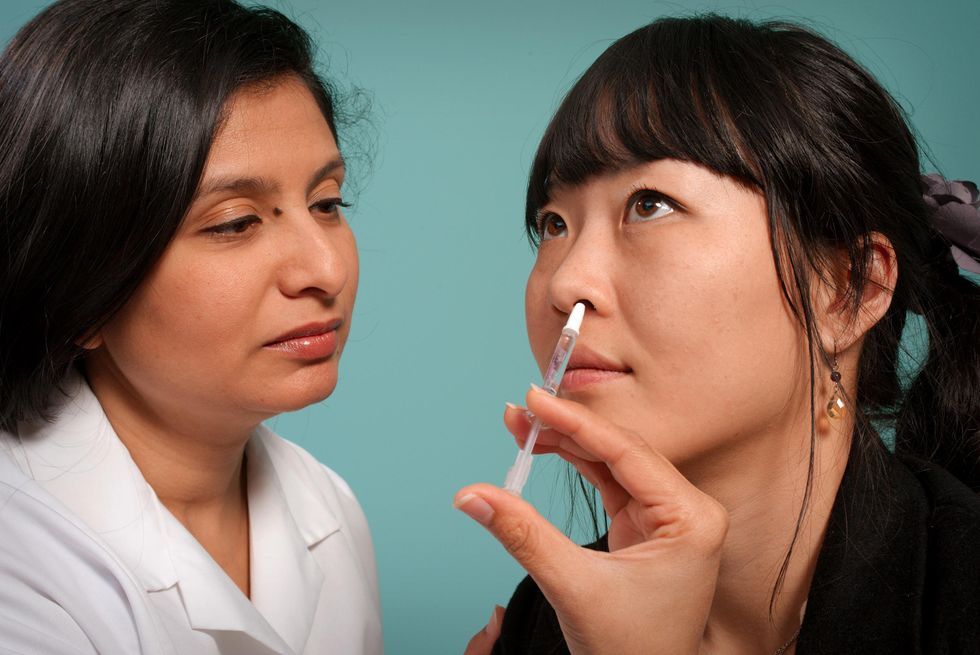What is post-nasal drip and what is the treatment? How does this differ from tonsillitis? What are some of the signs that may indicate that one has this condition? Post-nasal drip describes the feeling of mucus fluids sliding down the back of the throat, often causing cough. It's typical to swallow part of the mucus that's created in your nose and sinuses without even noticing it. However, if the mucus thickens or if there is more mucus than usual, post-nasal drip may occur.
There are many causes, some of which can be traced to sinusitis, allergic reactions to dust, and/or chemical irritants. When one's nose is blocked up, the result is a reduction in the strength of the nasal barrier. Once that barrier is reduced, mucous membrane inflammation occurs as debris of the lining of the sinuses is forced into the sinus cavities. This debris, mucous, provides a medium for bacteria to breed and an ideal place for allergens to stay.
Other common causes of post nasal drip include sinus infection, deviated septum, and a
deviated or collapsed voice box. A sinus infection causes congestion and a runny nose because one or more of your sinuses become irritated and fluid builds up. For others, the condition is often brought on by the use of antibiotics, post nasal drip due to a cold, or sinusitis (an infection of the sinuses). Deviated septum is another common cause of post nasal drip. In this case, mucous is pulled down into
the back of the throat and then drips into the back of the tongue, irritating and hurting the throat
when swallowing. Finally, a deviated or collapsed voice box may be the cause of post-nasal drip,
allowing the mucous to overflow and become slightly sticky, causing a painful and sore throat.
Symptoms
Post Nasal Drip (PND) is caused by phlegm that does not come out. Usually, excess mucous mixes with your mucous and is ingested without realizing it. However, the irritating sensation of thickened mucus dripping from your nose or collecting in your throat is known as post-nasal drip. It is characterized by a shooting sensation from your sinuses in the area of the cheekbones right below the eyes and in the rear of your mouth. Some people may have no symptoms, while some may have mild to severe PND.
It often occurs when the flow of stomach fluids back to the esophagus is blocked by the tongue and the pharynx. A person can have reflux for a number of reasons, including diet, smoking, obesity, GERD (gastroesophageal reflux disease), or structural abnormalities in the throat. Often medications such as antihistamines, NSAIDs (nonsteroidal anti-inflammatory drugs), or antibiotics can lead to the development of post reflux symptoms. Other medications such as decongestants, bronchodilators, and antipsychotic drugs are also associated with post reflux.
There are several treatment methods that can treat these reflux symptoms such as acid suppressants, histamine blockers, mucus antagonists, antispasmodics, and antihistamines.
Many factors may cause post nasal drip such as colds, flu, allergies, sinus infections, and seasonal allergies. People who have a tendency to get colds and flu are more prone to post nasal drip, while individuals who suffer from sinusitis and sinus infections may develop symptoms that lead them to have PND. While there are several medications available to treat the symptoms of this condition, some people prefer to take natural approaches to combat this problem.
How To Stop Post Nasal Drip with an Effective Treatment?
One of the most common natural remedies that help in the prevention of post-nasal drip is to take Vitamin C supplements. Antioxidants are known to have beneficial effects in the prevention of infection and the reduction of inflammation.
However, research has shown that taking Vitamin C supplements without the use of antibiotics could lead to the development of certain bacteria that can lead to symptoms of PND. In order to prevent viral infections and the occurrence of post-nasal drip, it is best to take Vitamin C supplements that have been proven to be safe and effective without the risk of causing infection.
A relatively common treatment method for this condition is changing your diet. Eliminate anything in your diet that is high in fat and sugar, as these tend to make your symptoms worse. This includes drinking sodas and other high-calorie carbonated drinks, which often contain more refined sugars and fewer nutrients.
It is also common for people to eat spicy foods which tend to irritate their sinuses, further irritating the mucous membranes. It is recommended that if you suffer from frequent colds or post nasal drip, that you avoid eating spicy and high fat foods.
Also Read About | Board Certified Autism Technicians
Another way of preventing or slowing down the development of PND is by avoiding certain foods and beverages. Chocolate is known to have a calming effect on individuals who suffer from reflux. However, individuals with a tendency to get colds should be wary of consuming chocolate or eating foods that are high in fat content. Fatty foods slow down the digestion process, which means that the body releases more mucus, which in turn leads to the symptoms of PND. Individuals with colds should also avoid taking over-the-counter medications such as decongestants and other medications that are known to treat this condition.
Individuals suffering from PND should also refrain from smoking, chewing tobacco, and drinking alcohol as they further complicate the production of mucous and compromise the immune system. Individuals with deviated septum should avoid smoking, since it increases the production of mucous, which in turn increases the risk of developing PND. Deviated septum refers to the septum that separates the nose into two parts. When the septum is deviated, the upper part of the nose is exposed than the lower part. Therefore, smoking makes it easier for bacteria to migrate from the lungs into the airways which in turn causes the symptoms of PND.
Many people turn to herbal remedies instead. These have been found to be as effective as traditional medicine, and often for much less money. Some of the most common herbs that are used to treat this common condition include: turmeric, eucalyptus, ginger, licorice and Cayenne. It is also recommended that you drink plenty of water. Doing so can help flush out your system and wash away any excess mucus and toxins that could be causing your symptoms.



 Christmas and New Year gift card
Photo by
Christmas and New Year gift card
Photo by  butter cookies on plate
Photo by
butter cookies on plate
Photo by  boy holding Holy
boy holding Holy 







